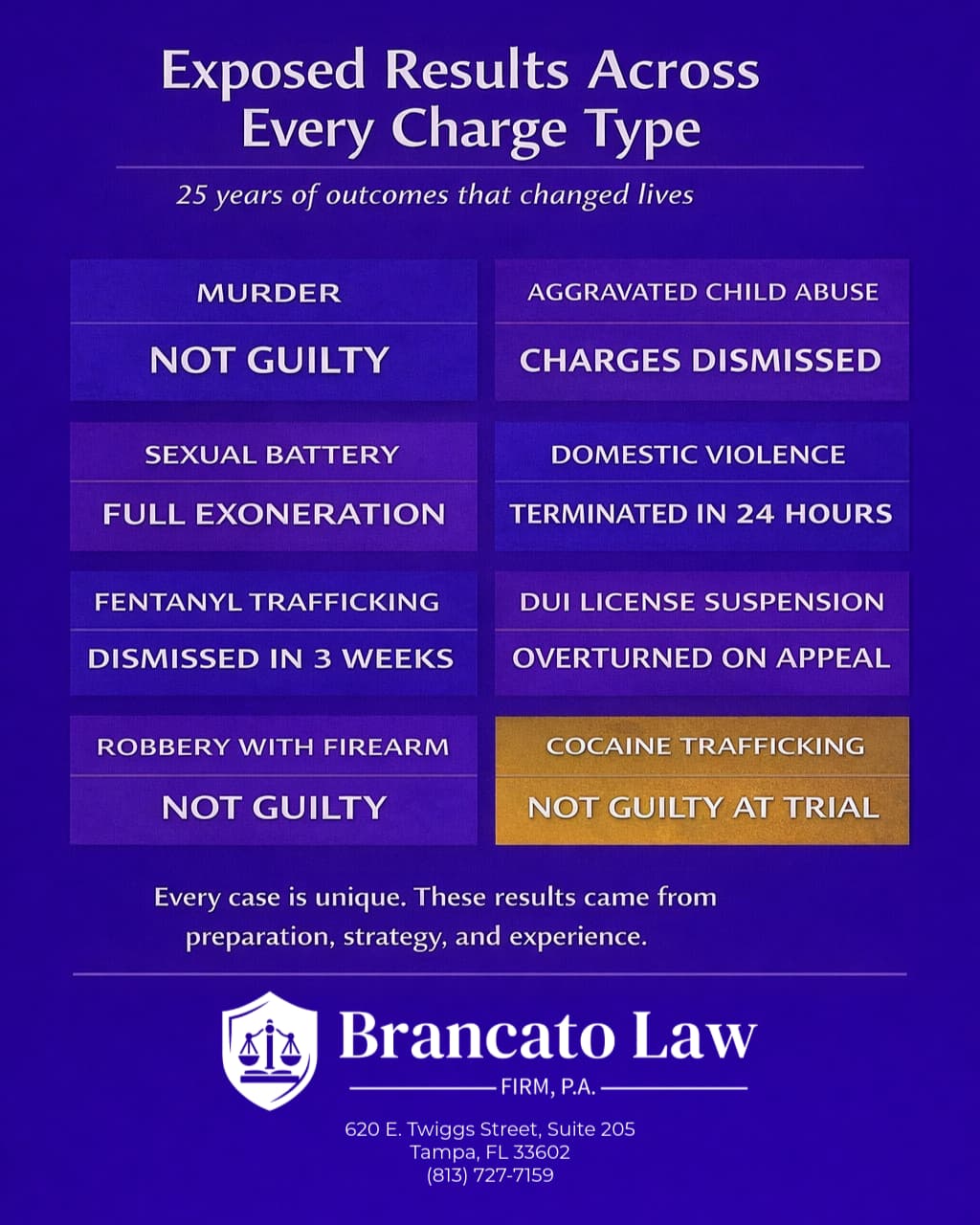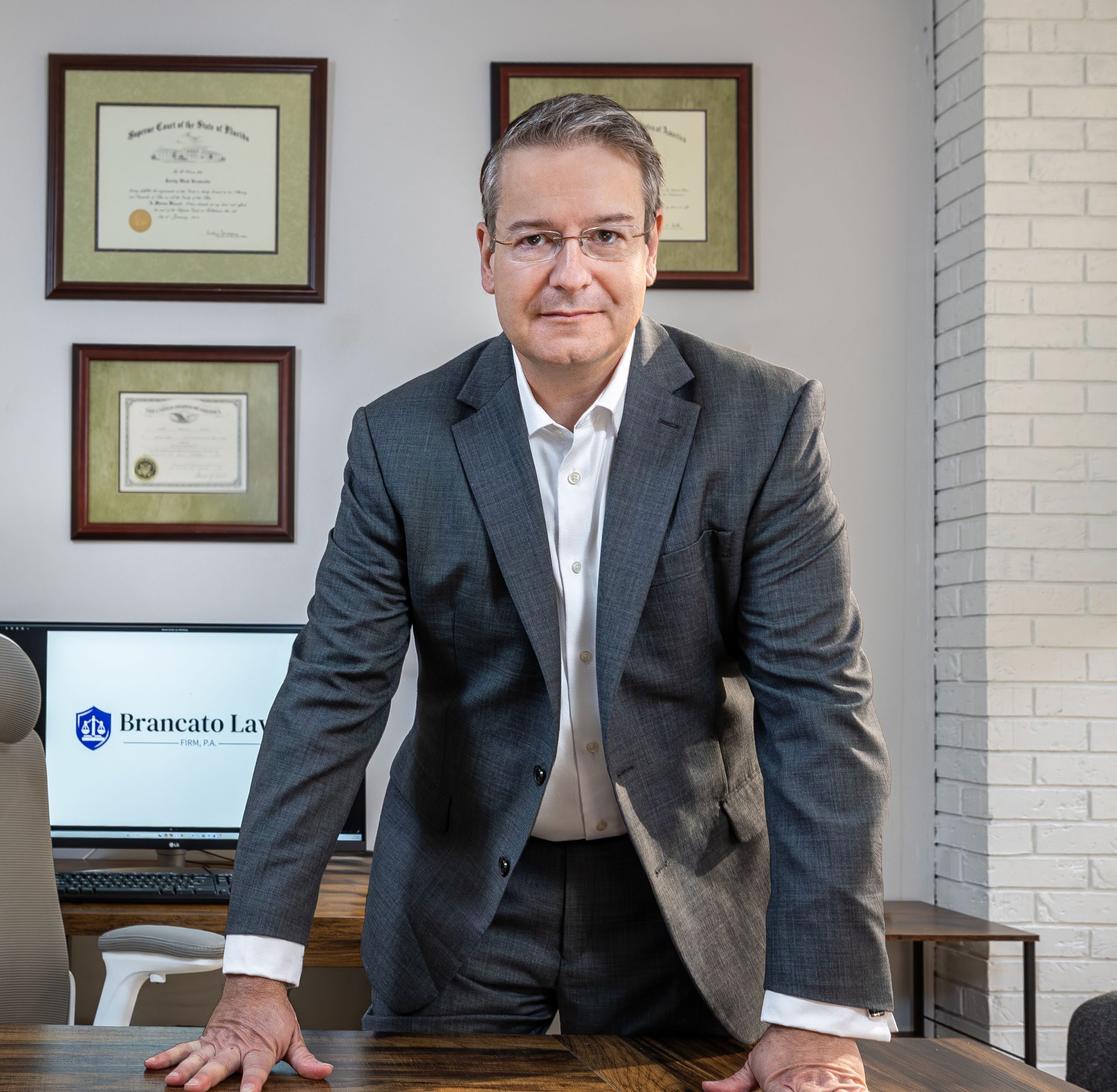From First DUI to Death Penalty
Case Results – Brancato Law Firm, P.A.

Homicide & Violent Crimes Results
Aggravated Assault – Charges Never Filed, Letter of Release Issued
(February 2026)
Rocky represented a client charged with Aggravated Assault, a third-degree felony punishable by up to 55 years in prison. Hired the day of the arrest, Rocky appeared at First Appearance Court and secured a low bond. Within 24 hours, Rocky contacted the alleged victim, who wanted the charges dismissed. Rocky prepared a handcrafted affidavit based on the alleged victim’s wishes, which the victim signed, notarized, and returned the next day. Rocky submitted the affidavit along with supporting background information to the intake prosecutor. Twenty-four days later, the State chose not to file charges and issued a Letter of Release.
Robbery with Firearm — Reduced, Life Sentence Avoided (January 2026)
Rocky represented a client charged with robbery with a firearm and aggravated battery with a firearm—charges carrying the possibility of a life sentence. Through deposition work and a mitigation presentation, Rocky demonstrated that his client’s involvement was significantly less than the codefendant’s.
The charges were reduced to grand theft and misdemeanor battery. The court withheld adjudication and sentenced the client to 180 days in jail. The client avoided both a life sentence and a felony conviction.
Battery — Dismissed After Frame-by-Frame Video Analysis (January 2026)
Rocky represented a woman who was actually the victim of a battery—but found herself charged instead. The incident occurred at a beloved Tampa sporting venue, and because the other party was an employee, police sided with her and arrested Rocky’s client.
The client came to Rocky after a frustrating experience with another attorney. Rocky conducted a frame-by-frame analysis of all video footage and generated a detailed audio transcript. The analysis showed the employee was the aggressor and that the officer could not have seen what she claimed. Rocky also obtained the “victim’s” medical records, which confirmed she was not injured despite her allegations.
Rocky presented his findings to the prosecutor. The State entered a Nolle Prosse, dismissing the case entirely.
Robbery Dismissed, Aggravated Battery Reduced to Misdemeanor (November 2025)
Rocky represented a woman accused of participating in a robbery and severely beating another woman. After Rocky’s investigation, the robbery was dismissed and the aggravated battery was reduced to a misdemeanor, resulting in a probationary sentence.
Gang Beating and Kidnapping — Reduced to Misdemeanors (September 2025)
Rocky represented a man initially arrested for kidnapping a fellow gang member and participating in a severe beating—beating him out of the gang. Rocky strategically chose not to waive speedy trial while he investigated the case. The leverage gained by working within speedy trial resulted in a plea offer to misdemeanor battery and probation—avoiding serious felony convictions for kidnapping and aggravated battery.
Battery on Law Enforcement — Old Warrant Resolved, Reduced to Misdemeanor (September 2025)
A man who had moved to another state reached out to Rocky about a 3-year-old warrant for Battery on a Law Enforcement Officer. Rocky obtained the file from the Public Defender and investigated the allegations. He worked out a resolution for a misdemeanor and credit for time already served. The man can now get on with his life without the felony warrant hanging over his head.
Not Guilty — Second-Degree Murder (Self-Defense)
Rocky defended a client accused of second-degree murder following a fatal shooting involving his roommate. The case proceeded to trial. The defense was based on the justifiable use of deadly force. Through direct examination, Rocky demonstrated that the shooting was in self-defense. The Tampa jury heard the evidence and returned a Not Guilty verdict, fully acquitting his client.
Murder and Aggravated Child Abuse — Charges Dismissed
In a highly sensitive case, Rocky defended a Tampa grandmother charged with first-degree murder and aggravated child abuse. The charges related to the drowning death of her granddaughter. Prosecutors initially alleged a liver laceration was evidence of abuse.
Rocky’s defense involved retaining a forensic pathologist and conducting an extensive review of medical records. He deposed the state’s medical experts. Through rigorous analysis, Rocky and his expert demonstrated the cause of death was drowning—and the liver injury resulted from CPR efforts, not abuse. This compelling evidence led the prosecutor to dismiss the murder and aggravated child abuse charges. The client ultimately received probation on a reduced charge of child neglect.
Vehicular Homicide — Reduced to Reckless Driving
In a tragic case involving a fatal single-vehicle crash, Rocky defended a client accused of vehicular homicide in Tampa. The prosecution alleged reckless driving caused the accident. Rocky retained an accident reconstruction expert and focused the defense on potential issues with the vehicle’s braking system. Through these efforts, Rocky successfully negotiated a reduction of the charge to reckless driving with serious bodily injury. His client avoided prison and received a sentence of 48 months probation.
Not Guilty — Kidnapping and Robbery
Rocky defended a client facing serious kidnapping and robbery charges in Plant City. At trial, Rocky presented a strong mistaken identity defense, challenging the prosecution’s evidence at every turn. The jury deliberated and returned a Not Guilty verdict on both charges, fully exonerating his client.
Not Guilty — Armed Robbery with Firearm (Two Counts)
Rocky represented a client accused of robbing a man for expensive car rims at gunpoint. Before trial, Rocky conducted a thorough personal investigation—visiting the client’s home, the incident scene, and the evidence room to examine all evidence, including a specific reversible jacket.
This meticulous preparation allowed Rocky to cross-examine the detectives with superior knowledge of the details and also prepare his client to testify. He mounted a successful mistaken identity defense. The jury returned Not Guilty verdicts on both counts of Armed Robbery.
Not Guilty — Armed Robbery (Wimauma)
Rocky defended a client accused of armed robbery. At trial, he employed a mistaken identity defense, highlighting a crucial detail: the victim failed to mention the defendant’s distinctive arm tattoo when describing the suspect to police. This significant inconsistency created reasonable doubt, leading the jury to return a Not Guilty verdict.
Not Guilty — Aggravated Assault and Battery
Rocky represented a man accused of aggravated assault with a deadly weapon and battery. At trial, through effective cross-examination and evidence challenges, the jury found his client Not Guilty of both serious counts.
Drug Crimes Results
Sale of Cocaine Near Church — Enhancement Dropped, Prison Avoided (November 2025)
A man represented by the Public Defender contacted Rocky on the eve of trial. The Public Defender’s best offer was a fairly significant prison sentence. According to discovery, the evidence was a video of the sale and testimony of the undercover officer. Discovery included screenshots from the video.
Rocky did what the assistant public defender never did: he demanded to see the video. It turned out the video had been misplaced—all that remained were screenshots and the officer’s testimony. Rocky worked out a resolution where the 1000-feet enhancement was dropped and the client received probation instead of prison.
Drug Possession (Multiple Counts) — Dismissed, Eligible for Expungement (October 2026)
Rocky represented a young man charged with multiple counts of possessing party drugs and pills. Rocky negotiated a diversion program that would result in dismissal upon completion. The client has since completed the program, the charges were dismissed, and he is now eligible to have his record expunged.
Fentanyl Trafficking — Dismissed in Three Weeks (March 2025)
Facing serious fentanyl trafficking charges, Rocky’s client was initially subject to a motion for pretrial detention. Rocky successfully challenged this motion, securing the client’s release on bond. He leveraged complex arguments surrounding constructive possession and questioned the legality of the vehicle search. Through strategic negotiation with the prosecutor, within just three weeks of the arrest, the prosecutor issued a Letter of Release, formally dismissing the fentanyl trafficking case.
Trafficking in Amphetamine — Diversion, Charges to Be Dismissed (August 2025)
When prosecutors charged his client with trafficking in amphetamine, the stakes could not have been higher. Rocky immediately attacked the State’s evidence, filing a motion to suppress that exposed serious weaknesses in the prosecution’s case. That motion created the leverage needed to negotiate a far better outcome: the trafficking charge was reduced, and the client was accepted into a diversion program. Under the agreement, the case will be dismissed once the client completes a drug evaluation and any recommended outpatient treatment.
Cocaine and Firearm — Both Charges Dismissed (January 2025)
Responding to an early morning call on the firm’s 24/7 line, Rocky swiftly acted for a client arrested for possession of cocaine and possession of a firearm during the commission of a felony. At the First Appearance hearing, Rocky argued the client’s actions did not meet the intent of the firearm statute, leading the judge to set low bonds.
Rocky’s immediate engagement with the intake prosecutor resulted in both charges being formally dismissed within days of the client’s arrest—preserving a clean record.
Not Guilty — Cocaine Trafficking (200-400 Grams)
A business manager was accused of trafficking 200-400 grams of cocaine in Tampa. At trial, the prosecution relied heavily on co-defendant testimony. Rocky successfully countered this by demonstrating the co-defendant was the actual trafficker—his client was merely present. The jury returned a Not Guilty verdict, clearing the client of all charges.
Not Guilty — Cocaine Delivery Near Church (Two Counts)
Rocky defended a client accused of delivering cocaine within 1000 feet of a church and possession of cocaine. At trial, Rocky presented a mistaken identity defense and highlighted poor police work. The jury found his client Not Guilty on both counts.
Not Guilty — Cocaine Sale Near Church and School
Rocky represented a man accused of selling cocaine within 1000 feet of a church and a school. He presented a defense of insufficient proof of guilt. The jury found his client Not Guilty on both counts.
Sex Crimes Results
Lewd or Lascivious Conduct Investigation — No Charges Filed (January 2026)
Rocky’s client was under investigation for lewd or lascivious conduct with his stepdaughter. The client was innocent—the child had fabricated the story in order to live with another family member.
Rocky interviewed witnesses and acted as a go-between with the detective while shielding his client from a police interview. After several months, the investigation was closed, the client was never arrested and no charges were ever filed.
Sex Offender Registration — Registration Requirement Avoided (January 2026)
A man who had been removed from the sex offender registry in another state contacted The Brancato Law Firm, P.A. after purchasing a residence in Florida. The Sheriff’s Office contacted him through his Ring camera while he was out of state, advising that he needed to register in Florida.
Rocky investigated and determined the client had not met the threshold for registration under Florida law. He contacted the Sheriff’s Office registration unit on the client’s behalf and obtained assurances that registration would not be required so long as the client did not return to Florida and meet the statutory threshold—saving the client from a lifetime of sex offender registration requirements.
Juvenile Sex Charges — Path to Dismissal, No Registration (September 2025)
Rocky represented a juvenile accused of sex offenses involving a younger child. Recognizing the long-term consequences of a conviction and sex offender status, Rocky negotiated an alternative rehabilitation plan tailored to the child’s needs. The agreement allows the juvenile to enter therapy under professional supervision, with the possibility of dismissal once treatment is completed. Most importantly, this resolution ensures the child will not be labeled a sex offender—protecting his future while addressing the situation through treatment rather than punishment.
Sexual Predator Designation — Corrected, Rights Expanded (August 2025)
Rocky represented a man who had been improperly designated a sexual predator years earlier by another attorney’s handling of his case. After uncovering the error, Rocky successfully corrected the designation, reducing his status to sexual offender. With that crucial step achieved, Rocky then filed a motion requesting relief from the harsh restrictions that had limited his client’s life. The court granted internet access and approved contact with family children under a therapist-approved safety plan, allowing the client to move forward with greater freedom and dignity.
Google Search Warrant — Sex Charges Avoided, Client Advised (August 2025)
A client reached out after receiving notice from Google that police had obtained a search warrant for her online records. The warrant had required Google not to disclose this until a specific time period passed. Rocky reached out to the agency, spoke with the detective, found out what the investigation was about, and invoked the client’s right to an attorney and to remain silent.
Ultimately, the agency decided not to proceed with charges on a case where someone in the client’s home had been chatting with a minor. The client’s worries were reduced, and she was armed with advice that will allow her to mitigate or eliminate any future investigation.
Solicitation to Commit Human Trafficking — Probation, Contact with Child Preserved (July 2025)
Rocky collaborated with another firm on a jury trial of a man accused of solicitation to commit human trafficking and using a computer to commit a sex crime. Although the client was convicted at trial, the work of both attorneys and the client’s participation in treatment before trial contributed to the judge departing from the guidelines and sentencing the client to probation. Because of the treatment completed, the client was able to maintain contact with his child and use the internet while on probation—significant relief from the restrictions that typically accompany such convictions.
Child Molestation Investigation — No Charges Filed (March 2026)
Rocky represented a man under investigation for molesting his niece. Rather than wait for charges to be filed, Rocky was proactive—contacting the law enforcement agency directly and acting as a go-between in providing and receiving information throughout the investigation.
Ultimately, no charges were ever filed. A great weight was lifted off the client’s back—one that could have haunted him for the rest of his life.
Sexual Predator Designation — Removed (April 2025)
A client sought help challenging a sexual predator designation imposed years prior by previous counsel. Rocky conducted a meticulous review of court records and relevant statutes and identified that the client did not meet the legal criteria for the designation. He filed a motion to correct the illegal sentence.
Although initially denied, Rocky filed a compelling motion for reconsideration. His legal analysis convinced the prosecutor to agree, leading the judge to withdraw the previous order and remove the sexual predator designation. This outcome significantly improved the client’s future prospects.
Cold-Case Sexual Battery (DNA) — Full Exoneration
Rocky defended a Tampa military veteran accused in a “cold hit” DNA case involving an alleged sexual battery that occurred eight years prior. Rocky recognized the critical nature of forensic evidence and retained a DNA expert, conducting a comprehensive review of all DNA evidence.
The expert’s analysis and assistance during depositions demonstrated that Rocky’s client was excluded as a contributor to the DNA profile from the victim. Based on this definitive evidence, the prosecutor dismissed all charges, achieving a full exoneration for the client.
Unlawful Sexual Conduct with Minor — Dismissed
Rocky represented a 27-year-old client accused of unlawful sexual contact with a 16-year-old. Rocky conducted an extensive investigation of the alleged victim’s social media, which revealed she presented as older online and appeared with other older men. He highlighted multiple inconsistent stories given by the alleged victim. This powerful evidence led the prosecutor to dismiss the charge completely.
Not Guilty — Sexual Battery (Ybor City)
Rocky defended a client accused of sexual battery and trespass in Ybor City. Prosecutors alleged the client lured the victim into a van. Rocky’s cross-examination highlighted inconsistencies in the allegations and established that the encounter was consensual. Evidence suggested the sexual assault claim arose only after they were discovered. The jury returned a Not Guilty verdict on attempted sexual battery, convicting only on misdemeanor trespass.
Lewd/Lascivious Conduct — Reduced, Avoided Sex Offender Registration
A client faced charges of lewd or lascivious conduct in front of children. The prosecution relied on child testimony. Through strategic cross-examination, Rocky exposed inconsistencies in their statements and raised doubts about their ability to accurately witness the alleged acts. The jury rejected the felony charge, finding the client guilty only of misdemeanor exposure of a sexual organ. The client successfully avoided sex offender registration.
DUI & Traffic Crimes Results
Failure to Appear and DWLS — Dismissed (January 2026)
Rocky’s client was arrested on a failure to appear warrant and a driving while license suspended charge. She had actually appeared on the date originally noticed—but the court date had changed and she never received notice because she had moved. She had even filed a change of address form with the clerk on the same day as her original court date.
Rocky filed an emergency bond motion and secured her immediate release on her own recognizance. He then worked out a resolution: the client would pay her outstanding traffic tickets and reinstate her license, and the charges would be dismissed. The State dismissed both charges.
Marijuana DUI — Reduced to Reckless Driving (September 2025)
Rocky represented a man pulled over by police. A marijuana blunt was lit at the time of the stop, and the video showed thick smoke emanating from the vehicle. After field sobriety tests, the client was arrested for DUI based on the officer’s belief that he was under the influence of marijuana. Rocky negotiated the charge down to reckless driving.
Expired Registration (Second Offense) — Charges Dismissed (August 2025)
Rocky represented a man charged with expired registration, second offense. Rocky worked out a resolution where the client would get his car registered and charges were dismissed.
DUI — Reduced to Reckless Driving (September 2025)
Rocky represented a man charged with DUI. There were open liquor bottles in the vehicle and the client had consumed alcohol—but he was not unlawfully impaired. Rocky negotiated a reduction to reckless driving.
DUI License Suspension — Overturned on Appeal, CDL Reinstated (September 2025)
After a DUI arrest, Rocky’s client lost both his standard driver’s license and CDL at the DHSMV administrative hearing. Rocky handled the hearing personally, and when the agency’s own officer upheld the suspension, he did not stop there. Rocky filed a petition for writ of certiorari in circuit court, persuaded a judge that the suspension was improper, and won a ruling reinstating both licenses. The decision not only restored the client’s driving privileges but also protected his livelihood as a commercial driver.
DWLS Exoneration — Body Camera Proved Wrong Person (May 2025)
A client facing driving while license suspended charges sought Rocky’s help. Rocky’s prompt investigation revealed the true driver had used his client’s identification. He immediately requested and obtained the police body camera footage, which confirmed his client was not the driver. The very next day in court, Rocky presented clear screenshots from the video to the prosecutor, resulting in the immediate dismissal of the DWLS charges.
Out-of-State Driver — Florida License Cleared (March 2025)
A man from another state contacted Rocky for help clearing old Florida DUIs that were blocking him from getting an unrestricted license at home. While other attorneys offered vague advice, Rocky researched the law, consulted with the Department of Highway Safety and Motor Vehicles, and provided a clear, step-by-step plan. The client recently reached out to share his success—his Florida license is now clear, and he holds an unrestricted license in his home state.
Not Guilty — DUI and Resisting Officer
Rocky defended a client charged with DUI (refusal) and resisting arrest without violence. He argued the client was not impaired, using scene video to support the defense. Rocky also contended the officer was overly aggressive and the client did not resist. The jury found his client Not Guilty on both counts.
Not Guilty — Felony DWLS (Habitual Traffic Offender)
Rocky represented a man accused of felony Driving While License Suspended with Habitual Traffic Offender status. At trial, the prosecution presented a redacted record. Rocky argued persuasively to the jury that a bureaucrat’s paper record should not be trusted when a man’s liberty is on the line. The jury found his client Not Guilty.
Child Abuse Crimes Results
Aggravated Child Abuse — Dismissed (Medical Evidence)
A father faced aggravated child abuse charges after his daughter was found to have a pancreatic injury. Initial medical opinions suggested intentional blunt force trauma. Rocky’s defense included retaining a forensic pathologist and thoroughly reviewing all medical records.
The expert analysis revealed the injury was caused by a congenital choledochal cyst—a condition present since birth, not abuse. This critical medical evidence led the prosecutor to dismiss all charges, completely clearing the father’s name.
Aggravated Child Abuse — Reduced (Medical Condition Defense)
A young man was accused of severely injuring his baby. After his arrest, doctors diagnosed the client with severe Toxoplasmosis—a condition that impaired his cognitive and physical abilities. Rocky obtained medical records and hired a psychiatrist who confirmed the condition impaired the client’s functioning at the time of the incident, rendering his conduct involuntary. The aggravated child abuse charge was reduced to misdemeanor battery with probation—a significantly more favorable outcome.
Domestic Violence Results
Domestic Violence Battery — Terminated Within 24 Hours (January 2026)
A mother contacted Rocky because her college-aged son had an active warrant for domestic violence battery. The family had called police only to get him mental health help—not to have him arrested.
Rocky worked with lightning speed, preparing affidavits for both parents to sign requesting that charges not be filed. He presented the affidavits to the intake prosecutor and explained the urgency. Within 24 hours of mom’s call, the State filed a Notice of Termination of Prosecution. The family was able to focus on getting their son well instead of having to deal with an arrest and navigating the criminal justice system. The client will not face lifelong collateral consequences such as ineligibility for gun ownership or military service since he was never arrested.
Domestic Violence — False Arrest Avoided (April 2025)
A young woman came to Rocky after her abusive ex falsely accused her of assault. A warrant was out for her arrest. Other attorneys advised her to turn herself in and lower her bond in court.
Rocky took a smarter route—he contacted the intake prosecutor, presented evidence of her abuse, and persuaded the State to drop the charges. The warrant was recalled, and she never had to go to jail or appear in court. Rocky then helped her obtain a restraining order to protect her from future harm.
Other Notable Results
Disorderly Intoxication and Harassing First Responder — No Filed (January 2026)
Rocky represented a man charged with disorderly intoxication and unlawfully impeding, threatening, or harassing a first responder in Ybor City. The incident was captured on video, and it was clear the client’s conduct did not constitute disorderly intoxication. The second charge, however, was a closer call.
Rocky presented mitigation to the prosecutor and worked out an agreement: the client would perform 10 hours of community service, and the State would not file charges. The State no filed both charges.
Loitering and Prowling — Diversion Obtained for Mentally Ill Client (October 2025)
Two parents reached out to Rocky on behalf of their son, who was incarcerated, mentally ill, and arrested for loitering and prowling. Rocky assisted the parents in navigating the bond process and worked out a diversion program where the client would receive a mental health evaluation and participate in treatment in exchange for dismissal of charges.
Two Probation Violations in 30 Days — Dismissal and Termination (July 2025)
Within a single month, the same client faced two separate violations of probation. On the first violation, Rocky successfully persuaded the court to dismiss the allegation entirely. When the client was brought back on a second violation just weeks later, Rocky again went to work—this time securing an order for probation to be terminated. The result: the client is no longer under supervision and faces no further probation or incarceration.
USF Student — Avoided Disciplinary Record (May 2025)
A parent retained Rocky to assist their student facing a Student Conduct & Ethical Development hearing at USF following an off-campus criminal arrest. Although the incident occurred off campus, it was deemed a potential violation of the USF Student Code of Conduct. Rocky provided detailed preparation materials and conducted a mock hearing to ensure the student was fully prepared. With Rocky’s support, the student presented effectively and confidently. The matter was resolved informally with no disciplinary record, and the student was allowed to continue their education without interruption.
Corruption by Threat and Resisting — Diversion Obtained, Deportation Avoided (April 2025)
Rocky represented a man charged with corruption by threat against a public servant and resisting an officer without violence. Because the case involved a law enforcement officer, the client—despite having no criminal record—was not eligible for diversion. He also faced deportation.
Rocky filed a motion to suppress, attacking the basis for the encounter. The officer had stopped the client over medical marijuana and believed it was unlawful to possess a marijuana pipe. However, unlike medical marijuana itself—which must be purchased from a licensed facility and kept in its original packaging—paraphernalia has no such requirement for someone with a valid medical marijuana license.
The motion created the leverage Rocky needed to negotiate a diversion program despite the law enforcement involvement. The client is now eligible for dismissal of the charges and has a pathway to avoid deportation.
Out-of-State Felony Warrant — Dismissed (February 2025)
An out-of-state visitor faced significant anxiety and potential arrest for over four years due to a lingering felony charge from a trip to Tampa. Feeling out of options, she contacted Rocky. He quickly gathered crucial facts and communicated directly with the State Attorney’s Office supervision. The result: the warrant was quashed and the entire case was dismissed.
Not Guilty — Escape (Forged Commutation Order)
This complex case involved representing a man accused of forging an order that would commute his life sentence and lead to his release. The forged order was officially clocked in at multiple locations—the Florida Department of Corrections, the prison, and the Miami Clerk of Court. Additionally, the client’s fingerprint was allegedly found on a copy.
Despite this evidence, Rocky mounted a unique defense. He conducted extensive research and investigation, disputed the fingerprint evidence at trial, and cross-examined officials from Miami, including a Circuit Judge. Tried in Pensacola, Rocky employed a strategy he called the “presidential election defense”—leveraging skepticism towards Miami officials following the controversial 2000 election to cast doubt on the paper trail evidence. He did not argue the officials lied, but highlighted the possibility of administrative errors and the lack of direct evidence that his client typed the forged order. The jury found Rocky’s client Not Guilty.
Important: Every case is unique. The outcomes described above depended on specific facts, evidence, jurisdiction, and other factors. Past results do not guarantee future outcomes. However, these cases demonstrate the level of preparation, strategic thinking, and courtroom skill we bring to every client’s defense.
Facing Criminal Charges in Tampa Bay?
Results come from preparation, strategy, and experience. For over 25 years, Rocky Brancato has fought for clients throughout Tampa Bay—in the courtroom when necessary, and through strategic negotiation when it serves the client’s interests.
At The Brancato Law Firm, we limit our caseload so every client receives the attention their case demands. If you’re facing serious charges, let’s discuss your options.
Call (813) 727-7159 for a Confidential Consultation
620 E. Twiggs Street, Suite 205
Tampa, FL 33602
Serving Hillsborough, Pinellas and Pasco Counties
FAQ About Brancato Law Firm Case Results
Tampa Criminal Defense Attorney Rocky Brancato handles serious felony cases throughout Hillsborough, Pinellas, and Pasco Counties. His practice focuses on homicide and violent crimes, drug trafficking and possession, sex crimes and sex offender registration issues, DUI and traffic offenses, child abuse allegations, and domestic violence charges. With over 25 years of experience, Rocky has secured dismissals, acquittals, and favorable resolutions across every category of criminal defense.
Yes. Rocky has achieved Not Guilty verdicts in murder trials, including a second-degree murder case where he successfully argued self-defense. He has also secured complete dismissals in murder cases, including a first-degree murder charge against a grandmother where Rocky’s forensic pathologist demonstrated the death was accidental, not abuse.
Rocky has a track record of getting trafficking charges dismissed or significantly reduced. In one fentanyl trafficking case, he secured dismissal within three weeks of arrest by challenging constructive possession and the legality of the vehicle search. In an amphetamine trafficking case, he filed a motion to suppress that created leverage to negotiate diversion, allowing for eventual dismissal.
Rocky has extensive experience defending clients accused of sex crimes, including sexual battery, lewd or lascivious conduct, and child molestation allegations. He has achieved full exonerations, including a cold-case DNA sexual battery where his expert proved the client was excluded from the DNA profile. Rocky also handles sex offender registration issues, having successfully removed sexual predator designations and helped clients avoid lifetime registration requirements.
Yes. Rocky routinely intervenes during the investigation stage to prevent charges from ever being filed. He acts as a go-between with law enforcement, shields clients from police interviews, conducts independent witness interviews, and presents mitigating information to prosecutors. In multiple cases—including child molestation and sex crime investigations—Rocky’s early intervention resulted in investigations being closed with no charges filed.
Rocky has tried well over 100 cases to verdict throughout his 25-year career, securing Not Guilty verdicts on charges including murder, armed robbery, kidnapping, cocaine trafficking, sexual battery, and DUI. His trial preparation includes personal investigation of crime scenes, evidence room inspections, retention of expert witnesses, and meticulous deposition work.
Rocky has a history of defending clients who were falsely accused or wrongly charged. He has secured dismissals by conducting frame-by-frame video analysis proving his client was the actual victim, obtained body camera footage proving mistaken identity, and presented evidence that accusers fabricated allegations. In domestic violence cases, he has prevented arrests entirely by presenting exculpatory evidence to intake prosecutors before warrants were executed.
Resolution time depends on the complexity of the case, but Rocky has achieved rapid results when circumstances allow. He has secured dismissal of fentanyl trafficking charges in three weeks, terminated domestic violence prosecution within 24 hours, and resolved felony warrants within days of engagement. When speed serves the client’s interests, Rocky moves decisively.
Yes. Rocky understands the immigration consequences of criminal convictions and has successfully negotiated outcomes that preserve clients’ ability to remain in the United States. In one case involving corruption by threat against a law enforcement officer, Rocky filed a motion to suppress that created leverage to obtain diversion—providing a pathway to dismissal and avoiding deportation for a client who would otherwise have been ineligible for such a program.
The Brancato Law Firm, P.A. serves clients facing criminal charges in Hillsborough County, Pinellas County, and Pasco County, Florida. The office is located at 620 E. Twiggs Street, Suite 205, Tampa, FL 33602.
To discuss your case with Tampa Criminal Defense Attorney Rocky Brancato, call The Brancato Law Firm, P.A. at (813) 727-7159 for a confidential consultation. The firm’s 24/7 line ensures you can reach an attorney when you need one most.
The Brancato Law Firm, P.A. is a Tampa-based criminal defense practice serving clients exclusively in Hillsborough, Pinellas, and Pasco Counties. We are not affiliated with any other Brancato-named law firms.
This page is for informational purposes only and does not constitute legal advice. Each case is unique, and outcomes depend on the individual facts and circumstances involved. Past results do not guarantee future outcomes.


















